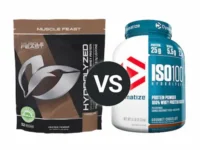Knowledge BaseYou're Questions Answered
BACK
Can whey protein powder cause diarrhea?
Yes, whey protein powder can cause diarrhea in some individuals, especially if consumed in large quantities or if the person has specific sensitivities. Several factors can contribute to digestive issues when using whey protein, including lactose intolerance, poor-quality additives, or excessive protein intake.
Reasons Why Whey Protein May Cause Diarrhea
- Lactose Intolerance
Whey protein, particularly whey concentrate, contains lactose, which is a sugar found in milk. People who are lactose intolerant lack the enzyme lactase, which is needed to digest lactose. When lactose is not properly digested, it can lead to gastrointestinal symptoms such as bloating, gas, and diarrhea1. Whey protein isolate has much lower lactose content and may be a better option for those with mild lactose intolerance. - Additives and Fillers
Some whey protein powders contain artificial sweeteners (like sucralose or acesulfame potassium) or other additives, which may cause digestive upset in sensitive individuals. These ingredients can sometimes irritate the digestive system, potentially leading to diarrhea2. - Excessive Protein Intake
Consuming too much protein, whether from whey or other sources, can overwhelm the digestive system. High protein intake can increase water secretion into the intestines, potentially causing diarrhea in some individuals3. Moderating your protein intake based on your body’s needs is important to avoid digestive issues.
How to Prevent Diarrhea from Whey Protein
- Choose Whey Protein Isolate
If you are sensitive to lactose, opt for whey protein isolate, which contains minimal lactose, or a lactose-free protein powder. - Avoid Artificial Additives
Choose high-quality whey protein powders with minimal ingredients, preferably without artificial sweeteners, colors, or preservatives that might irritate your digestive system. - Control Your Portion Size
Stick to the recommended serving size and avoid consuming too much protein at once. This can help prevent overwhelming your digestive system and causing diarrhea.
Whey protein powder can cause diarrhea, especially in individuals who are lactose intolerant or sensitive to certain additives. Opting for whey protein isolate, avoiding artificial additives, and controlling portion sizes can help reduce the likelihood of experiencing digestive discomfort.
Was this answer helpful? Let us know!
Like
References:
- Melnik, B. C., & John, S. M. (2015). Milk consumption and acne: the role of acne-promoting dietary proteins and lactose. Journal of the American Academy of Dermatology, 72(5), 894-896.
- U.S. National Library of Medicine. (2020). Artificial sweeteners: a systematic review of metabolic effects in youth.
- Institute of Medicine (US) Committee on Military Nutrition Research. (1999). The Role of Protein and Amino Acids in Sustaining and Enhancing Performance. Washington, DC: National Academies Press.
Add to this Answer
Related Questions

Disclosure
Your Answer
Do you have a suggestion to improve the answer? Please detail your suggestions and provide any references to information that may support your answer if available.
The content on this site has not been written, reviewed or endorsed by a medical professional. We assume no liability for the misuse of supplements and recommend you review the label of any product, as well as consulting with your health care professional.
We are a participant in the Amazon Services LLC Associates Program, an affiliate advertising program designed to provide a means for us to earn fees by linking to Amazon.com and affiliated sites.
We are a participant in the Amazon Services LLC Associates Program, an affiliate advertising program designed to provide a means for us to earn fees by linking to Amazon.com and affiliated sites.
© 2026 ProteinPowder.com






